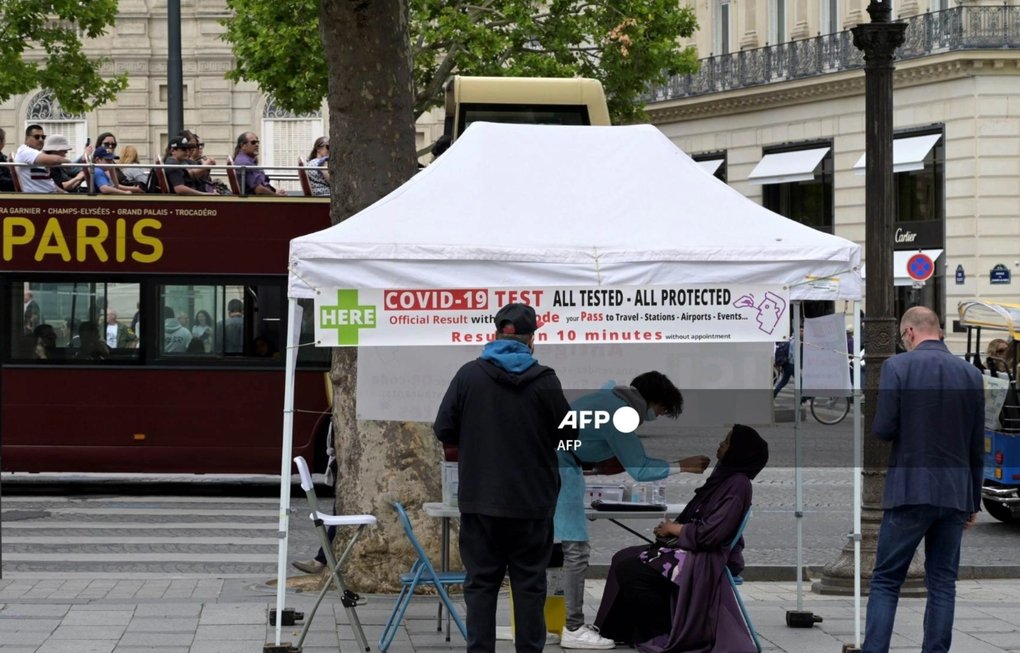(Dan Tri) – European countries, even those that have applied the strictest Covid-19 epidemic prevention measures, are cautiously dealing with the new wave of infections.
Many people gathered around the Trevi fountain in Rome, Italy (Photo: AFP).
Customers at a bookstore in Rome, Italy did not pay attention to red circular stickers on the floor instructing them to prevent the epidemic by maintaining `a distance of at least one meter`.
Across Europe, regulatory signs fade into the grim remnants of the past horror days of the fight against Covid-19.
A common refrain heard across Europe is that everyone is susceptible as the BA.5 Omicron sub-variant fuels an explosion of infections across the continent.
Living with viruses
However, governments are still listening, even in countries that previously had the strictest epidemic prevention regulations.
On the subway in Paris, France, the seats with blue social distancing signs faded, making train riders seem to have forgotten those gloomy days.
Many Germans did not wear masks as they passed by tattered epidemic warning signs in stores and restaurants that read `Maskenpflicht` (Masks required).
At a construction materials store north of Madrid, Spain, employees also did not wear masks.
And many people are flocking to travel, both within and outside Europe, bringing huge revenues to countries desperate to boost their economies.
`That’s what happens. It’s worth noting that summer infection confers more immunity for the difficult winter months,` said Andrea Crisanti, a professor of microbiology, formerly
`However, allowing the disease to spread at such a rate also creates a ‘moral obligation’ on governments to protect the elderly and vulnerable, who are still at risk of contracting the disease.`
According to him, `we need to change the model`, and listed the reasons for the current wave of indifference as social exhaustion with anti-epidemic restrictions, and a high risk-taking mentality.
That appears to be the trend across European countries, where officials have insisted on apparently low rates of serious illness and death, even as some experts worry about the number of vulnerable people.
Christophe Fraser, an epidemiologist at Oxford University, UK, said the `random element` creating new mutations is `worrying`.
Sarah Crofts, head of the statistics office’s analysis team, said: `Cases show no sign of falling, with rates approaching levels last seen in March at the peak of the Omicron BA.2 wave
Hospitalizations have more than quadrupled since May, according to government data.
In April, the European Medicines Agency (EMA) recommended that a second booster shot only be needed for people over 80 years of age, at least until they see a `resurgence of the epidemic`.
On July 11, the EMA decided that time had come, recommending a second booster shot for everyone over 60 and all vulnerable people.
Across Europe, authorities are trying to strike a balance between reassurance and complacency.
In Germany, the Robert Koch Institute, the federal organization responsible for monitoring the epidemic, said there was `no evidence` that the BA.5 strain is more deadly.
Germany’s vaccine committee has not yet updated its recommendation on the fourth shot and currently recommends a second booster shot only for people over 70 years old and at-risk patients.

Covid-19 testing tent on the streets of Paris (Photo: AFP).
In France, we are seeing an average of 83,000 cases per day.
Mr. Braun is confident that France, where nearly 80% of its people are fully vaccinated and its hospitals, can weather the new wave of infections and has focused more on collecting data to monitor
Last week, the French parliament rejected a government proposal to check people’s vaccination certificates or negative Covid-19 tests before entering France.
In Spain, where the vaccination rate is above 85% and more than half the eligible population has received a booster shot, the pandemic seems like a memory as people return to beach holidays
`The current wave shows trends in other European countries before and they do not see any major impact on the health system,` Deputy Health Minister Josef Pavlovic said.
Bars, restaurants and cinemas are full in Denmark, where the number of infections has increased 11% in the past two weeks, including hundreds of people attending a music festival this month.
In Italy, the first Western country to face a pandemic, reports of new infections have increased steadily since mid-June, although they have decreased in the past week.
Health Minister Roberto Speranza announced that Italy will follow the European regulator’s recommendation of a second Covid-19 booster shot for everyone over 60 and vulnerable patients.
He predicts that over time, as vulnerable seniors pass away, deaths caused by the virus will decline and Covid-19 will become endemic.
Meanwhile, another woman at the Roman bookstore wearing an N95 mask worried that the red request sign at her feet would be applied again.
`Reality will always go faster than the law,` she said.










